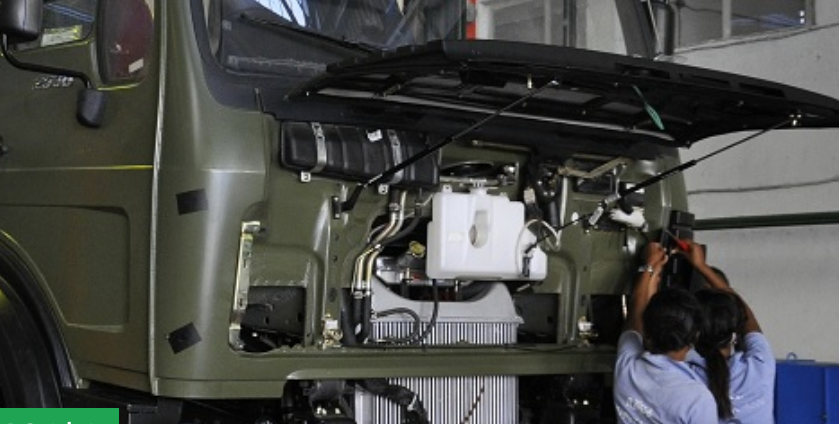
Fortune News | Mar 14,2020
Mar 14 , 2020
By SEBLE WONDEMAGEGN ( FORTUNE STAFF WRITER )
 Bishoftu Automotive Engineering Industries has secured a contract for the supply of a total of 126 heavy trucks to the state construction company for 327 million Br.
Bishoftu Automotive Engineering Industries has secured a contract for the supply of a total of 126 heavy trucks to the state construction company for 327 million Br. Bishoftu Automotive Engineering Industries has secured a contract for the supply of a total of 126 heavy trucks to the state construction company for 327 million Br.
A subsidiary of the state-owned Metals & Engineering Corporation (MetEC), Bishoftu Automotive will assemble and supply the trucks in four different models to the Ethiopian Construction Works Corporation. The contract includes three tractor trucks with low-beds, 120 Beiben dump trucks, two mixer trucks and one fuel truck.
So far, Bishoftu Automotive, which was re-established in 2010 with a capacity to produce four vehicles in eight hours, has supplied 51 Beiben dump trucks and the fuel truck.
The remaining trucks are expected to be delivered in the next two months, according to Fikiru Abebe, head of a secretariat office at Bishoftu Automotive, which was first established in 1984 and operated under the Ministry of Defence.
It was re-established in 2010 as a public enterprise under MetEC to perform a leading role in assembling both military and commercial vehicles. It started manufacturing vehicles in June 2011 by importing parts from China and Europe.
The Corporation awarded the company with the contract through a direct procurement process after getting approval from the Ministry of Finance. The contractual agreement between the Corporation and Bishoftu Automotive was signed last July.
The Corporation, which was re-established in December 2015 with the Council of Minister's regulation and contains six sectors with different operational activities, paid 30pc of the total value of the trucks as an installment payment last November.
After receiving the trucks, the Corporation will be deploying them to more than 30 of its projects, according to Alehegn Mossu, deputy CEO of the Corporation in charge of construction equipment and the machinery management division.
“Spare part shortages and lack of forex are among the challenges we are confronted with,” said Alehegn.
Bishoftu Automotive Engineering, one of the dozen industries under the Corporation, assembles different types of civil vehicles to fill the gap in the local market and plans to join the international market soon, according to Fikru.
“We assemble and provide military armaments to local and international clients, including the African Union,” said Fikru.
To date, it has over 3,000 employees and assembles buses for Anbessa City Bus Service Enterprise, the Public Service Employees Transport Service Enterprise and the Sheger Express Bus System.
But currently, most of the inputs including the cabins are produced locally, according to Fikru.
Assembling vehicles locally has its own advantage, since the vehicles will be assembled at the buyer's desired speed and expense, according to Eshetie Berhan (PhD), an associate professor at Addis Abeba University's Institution of Technology in the department of mechanical & industrial engineering.
However, Eshetie says that he observes many of the locally assembled vehicles having defects on their bodies.
“I observe that locally assembled trucks don't have technical problems," he said, "but their bodies have some defects and a shortage of spare parts is a challenge."
Eshetie also recommends that the government provide guidance on how much assemblers should manufacture, since most of the companies are operating under their capacity. He also says that the share of the locally-produced material on the assembled vehicles should be increased.
PUBLISHED ON
Mar 14,2020 [ VOL
20 , NO
1037]

Fortune News | Apr 03,2021

Fortune News | Dec 05,2018

Verbatim | Dec 07,2019

Radar | Apr 22,2022

Radar | Nov 27,2018

Dec 22 , 2024 . By TIZITA SHEWAFERAW
Charged with transforming colossal state-owned enterprises into modern and competitiv...

Aug 18 , 2024 . By AKSAH ITALO
Although predictable Yonas Zerihun's job in the ride-hailing service is not immune to...

Jul 28 , 2024 . By TIZITA SHEWAFERAW
Unhabitual, perhaps too many, Samuel Gebreyohannes, 38, used to occasionally enjoy a couple of beers at breakfast. However, he recently swit...

Jul 13 , 2024 . By AKSAH ITALO
Investors who rely on tractors, trucks, and field vehicles for commuting, transporting commodities, and f...

Oct 18 , 2025
The political establishment, notably the ruling party and its top brass, has become p...

Oct 11 , 2025
Ladislas Farago, a roving Associated Press (AP) correspondent, arrived in Ethiopia in...

Oct 4 , 2025
Eyob Tekalegn (PhD) had been in the Governor's chair for only weeks when, on Septembe...

Sep 27 , 2025
Four years into an experiment with “shock therapy” in education, the national moo...